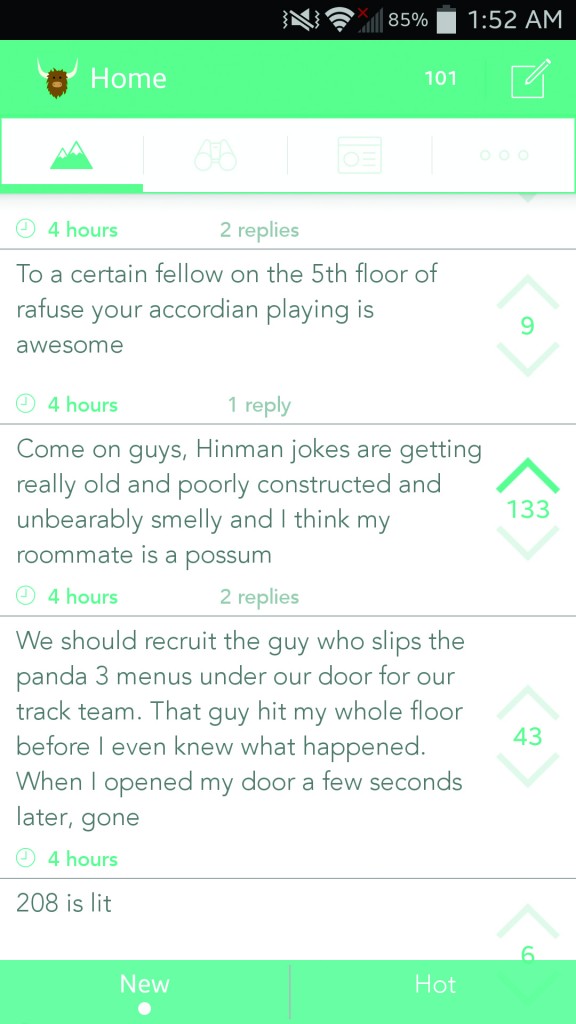
There’s a new app in town that everyone’s using, but few are talking about. The latest app to first get popular on college campuses, Yik Yak is an anonymous messaging app that works a bit like a public bulletin board. It’s basically what would happen if Formspring, Twitter and Reddit had a baby.
Available on both iOS and Android, Yik Yak transforms the smartphone into a device that grants the user access to the innermost thoughts of those around them. No handles, no worries: On the app’s home screen, one sees a location-based feed that displays posts, or “yaks,” of all posters within a 1.5 mile radius. These posts are text-only (no emojis) and limited to 200 characters. Posters can elect to provide a handle, but it’s not a popular option. People like the anonymity. While your posts are limited to a 1.5 mile radius, the app has a page where you can read, but not post, yaks from other schools by “peeking” into other locations. Yik Yak has also created a number of fictional locations, such as “Freshmen Tips (Definitely Not Fake)” and “Hogwarts,” filled with yaks of a corresponding theme.
Users can interact with posts by ranking and/or replying to them. Each post has a score, which can be positive or negative depending on how well the post is being received by local “yakers.” The ranking system works in a very simple up-vote/down-vote mechanic. Posts receive a point every time someone up-votes, but lose a point every time someone down-votes. Each anonymous user also has a score, called “yakarma,” which, while not very clever wordplay, corresponds to the sum total score of all the users’ posts. Replying allows one to respond to any post, essentially creating a message board on some of the more popular yaks. Like posts, replies are also ranked and can affect a user’s yakarma. For obvious reasons, the app removes all yaks containing people’s names, but otherwise it’s a no-holds-barred platform of public opinion.
Yik Yak was launched in November 2013 by Brooks Buffington and Tyler Droll, two Kappa Alpha fraternity brothers, soon after they graduated from Furman University. By Christmas of that year, the pair began pitching their app to Greek Life on campuses across the country. Since its launch, Yik Yak has users in over 250 college campuses.
Last semester, many Greek Life members at Binghamton University used the app to spread rumors about other Greek Life groups.
“From what I get it’s just another way for people to make fun of each other anonymously,” Dimitri Michaloutsos, a member of Sigma Beta Rho and a senior double-majoring in political science and economics, wrote in an email. “No one I know uses it maliciously. The greeks who do use it maliciously don’t realize they’re not just shining the fraternity or sorority they’re targeting in a bad light, but they’re perpetuating all the horrible stereotypes of greek life and making us all look bad.”
While the founders plug the app as generating positive commentary, some say it’s a harbor for cyber-bullying with no repercussions, like any other gossip app — especially among high school crowds. Because of its hyper-local nature, nasty rumors targeting individuals and institutions can spread very quickly. The negative media hurts its ability to earn revenue and raise capital from investors and advertisers alike, the main sources of social media revenue. Nevertheless, on June 30, 2014, Yik Yak announced that the company raised $10 million of capital.
With this new source of capital and a wide consumer base, all Yik Yak needs to do is quell its media association with cruel rumormongering before it can start generating a revenue stream. While the future of the app is unclear, Buffington remains hopeful.
“When Snapchat first came out, everyone heralded it as a sexting app,” Buffington told Business Insider in June. “Hopefully when we get passed all of that initially, people will realize Yik Yak is not just a place for gossip.”
Ultimately it’ll be the choices of the users, not the company, that will determine the future of Yik Yak and the type of service it will provide.
BU seems to have two predominant localized feeds: on-campus and Downtown (around State Street). While there is a definite Greek Life presence on Yik Yak, it’s safe to say that it’s not the only presence. The feeds are buzzing into the early hours of the morning most weekend nights with people regaling tales of bar stories and sexual conquest. While the validity of the posts are always in question, it would be nice to live in a world where people get into the Rathskeller with a Pokémon card (apparently, it was holographic).
Yik Yak is not only a weekend activity, however. Everyday, the yak feed is full of witty thoughts and common gripes. The app had gotten so popular, that this week Binghamton traffic temporarily overloaded the app’s servers. Is there room for abuse? Yes, but at BU, the app is proving itself to be more of a message board than a gossip app. Let’s hope it stays that way.


